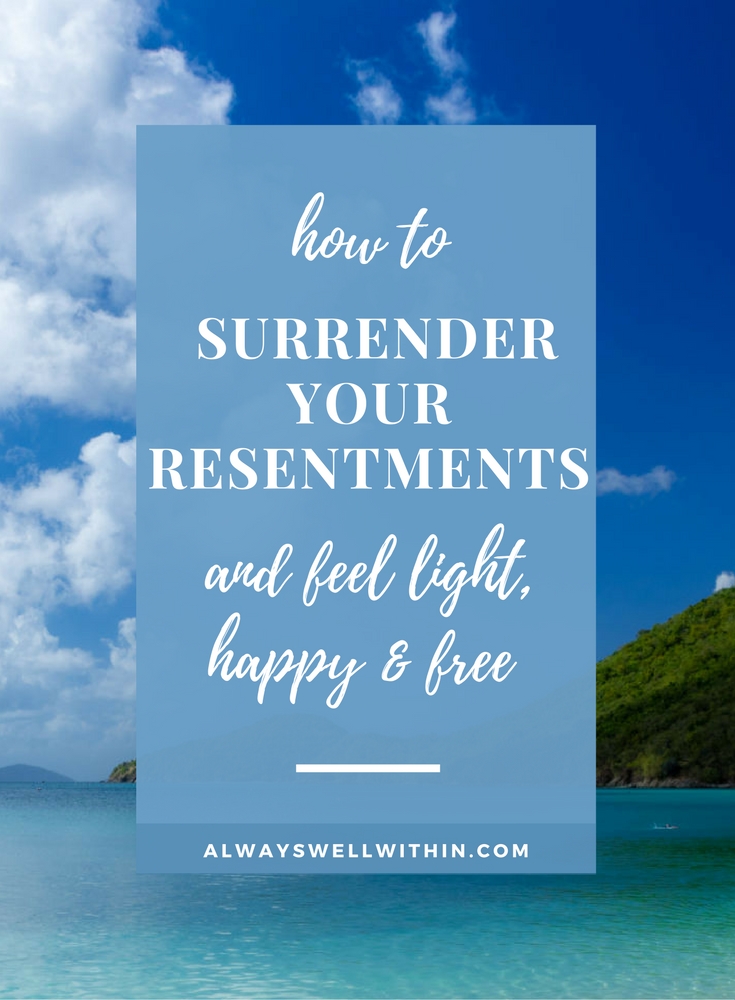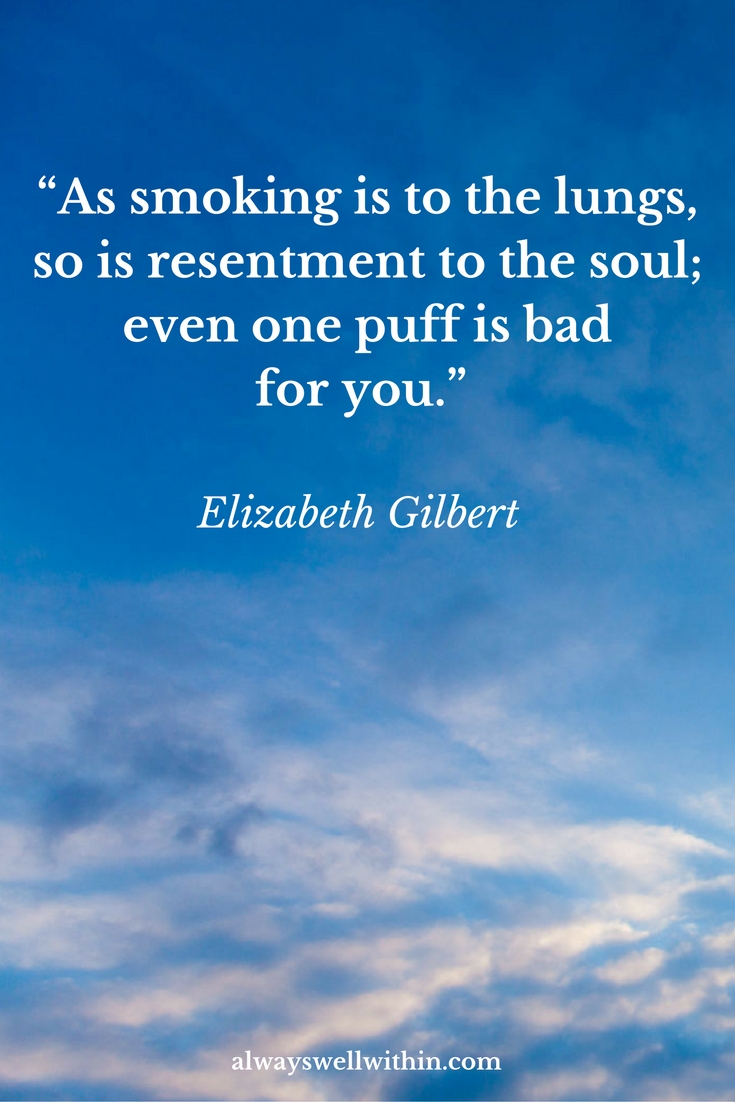 Most of us are sitting on a stockpile of resentments from early childhood. You may not be aware of these bad feelings on an hour-by-hour basis, but often they silently dictate your choices, your responses, and your actions.
Most of us are sitting on a stockpile of resentments from early childhood. You may not be aware of these bad feelings on an hour-by-hour basis, but often they silently dictate your choices, your responses, and your actions.
Resentments suddenly come alive when triggered by situations, challenges, and the words or behaviors of others. They entangle you in endless emotional drama and suck the joy right out of your life.
These hurts must be healed if you hope to find genuine happiness and become a beacon of light for others.
Lately, I’ve been noticing how resentment appears on my emotional landscape far more than I imagined. For example, I feel indignant when my personal boundaries are violated. I feel annoyed when someone treats me in a condescending way. I feel invisible when someone tries to place their agenda on me.
I may not feel resentful when the incident occurs if I’m caught in trying to please or feel I need to obey. It may be weeks before the feeling of resentfulness arises. However, once I realize how my previous response was out of sync with my heart, it does appear.
Stepping out of the situation, saying, “no,” or establishing my boundaries in other ways begins the healing process for me. But shards of resentment may still present themselves months later if a part of me never fully healed and I still live with the consequences of a particular interaction.
Rest assured, I’m not constantly brewing in resentment. But when a particular memory appears, it can trigger a deluge of resentfulness, which often catches me by surprise. I’ll think, “Haven’t I healed that?” Apparently not.
And that’s okay because healing doesn’t always happen in a flash. Often, healing occurs slowly over time.
Lest I sound like some kind of resentment freak, I’m probably more acutely aware of resentments at this point in my life because I’m emotionally ready to heal them, and I’m dedicated to growing my sense of self-sovereignty. I may even be attracted - in unconscious ways - to authority figures who rub me the wrong way and challenge my capacity for self-rule. It certainly seems that way when I look back at all the testy encounters I’ve had in the past year.
Resentments may run deep, and it can be painful when they surface. But it doesn’t always have to be overwhelming, difficult, or complex to heal them.
How I Heal Resentments
What do I do when I become aware of a resentment?
Sometimes, I work on it in psychotherapy. This often leads back to an initial incident from my childhood, one that longs to be healed. I only spend an hour a week in therapy, but often that’s enough to crack it open so the healing can begin.
Sometimes, I allow my dreams to process it. I rarely record my dreams, but I recognize their healing power. I trust that my psyche is handling the gooey stuff for me while I sleep. So further intervention may not be needed. But sometimes I’ll bring a dream to therapy if I sense more work needs to be done.
Sometimes I ask, “Who am I angry toward?” I allowed the boundary violation, didn’t I? So instead of projecting on the other person, what can I learn from the experience? Can I forgive the person? Can I forgive myself? I always strive to make different decisions and to act in new ways as a result of a resentment. That, I feel, is true healing.
Other times, I’m just aware of the resentment. I don’t judge it. I don’t suppress it. I just notice it’s still there. I know that by noticing, but not acting on it, this resentment will slowly heal and weaken. I don’t feel I always need to give a resentment loads of attention or energy. Sometimes, the more you focus on the negative, the more it grows out of proportion.

Meditation students sometimes ask me if it’s enough to simply be aware of your resentments. They wonder if they need to analyze them and understand the why behind it all. It depends upon where you're at on you on your healing path. Analysis can be helpful, but there's a danger of getting stuck in your head.
You can actually heal your wounds considerably through applying awareness when they arise without adding more thoughts, as long as you’re not suppressing or denying your emotions. Mindfulness and awareness is a subtle art, however. You can also fool yourself by using meditation to numb yourself out if you’re not careful.
When you start working with resentments, use whatever skillful means work for you, knowing that as you heal you’ll gradually be able to rely on mindfulness and awareness more and more.
Wholeness Means Self-Acceptance
Wholeness means accepting yourself, hurts and resentments and all. If hurts and resentments are coming to the surface, it’s a good sign that you’re ready to heal. There’s no reason to feel bad when these emotions arise. It’s a good time, however, to use discernment so you don’t act in ways that are harmful to yourself or someone else.
While it’s good to be clear about your boundaries, it won’t be helpful to project on another person or group of people. Moving into blame or aggressive behavior can be a warning sign that you’re acting out unconscious patterns. Unbridled anger possesses a far different quality than clarity and self-sovereignty.
At first it may be difficult to discern between projections and what needs to be rightly said. But you'll learn to make the distinction through trial and error.
Once, I reach clarity, I usually look at how to gracefully exist the unhealthy situation without a complicated exchange. I now know this person and their methods are not a good fit for me, but that doesn’t mean they’re not perfect for someone else. Even in my case, maybe they presented the ideal obstacle on my path to greater self-sovereignty. I don’t need to convince, change, or fix the other person. I’m ready to move on.
You Aren't Powerless
Some people will always violate my boundaries because they can’t read my mind. They don’t necessarily know my boundaries unless I communicate them.
- There will always be someone who speaks to me in snarky way because no one is perfect.
- There will always be someone who pushes their agenda on me because people are working out their own hurts and resentment.
- There will always be someone who wants me to do more than I want to do because that’s just how people are.
If I let unconscious beliefs rule the show, I will feel powerless and victimized by others. That just leads to emotional entanglement and unnecessary drama. And, it's not true — I'm not powerless and neither are you.
Release Your Resentments So You Can Feel Light, Happy, and Free
When instead, I pledge to be aware of my resentments and work with them in the ways above, I feel light, happy, and free. By continuing in this way, I believe a time will come when I no longer get involved in unhealthy interactions. I’ll see them coming from a mile away instead of after the fact. And generally, I'll be less perturbed by the behavior of others.
In the meantime, almost every time I write an article like this, as if on cue, the universe provides me with a strong trigger — sometimes revealing my progress, sometimes revealing my shortcomings and making me eat humble pie. So I empathize, dear reader. I know it's not easy to surrender your resentments, but I have every confidence you'll master this skill with practice and time.
Take a few moments to look into your heart. Are there any resentments hiding there? If so, use one of the above methods to help you begin the process of healing. And whenever a resentment suddenly arises, open up your self-healing kit - the steps outlined above - and apply the right medicine. You’ll feel so much lighter and happier as the burden of resentments begins to dissolve.
Thank you for your presence, I know your time is precious! Don’t forget to sign up for my e-letter and get access to all the free self-development resources (e-books, mini-guides + worksheets) in the Always Well Within Library. May you be happy, well, and safe – always. With love, Sandra
